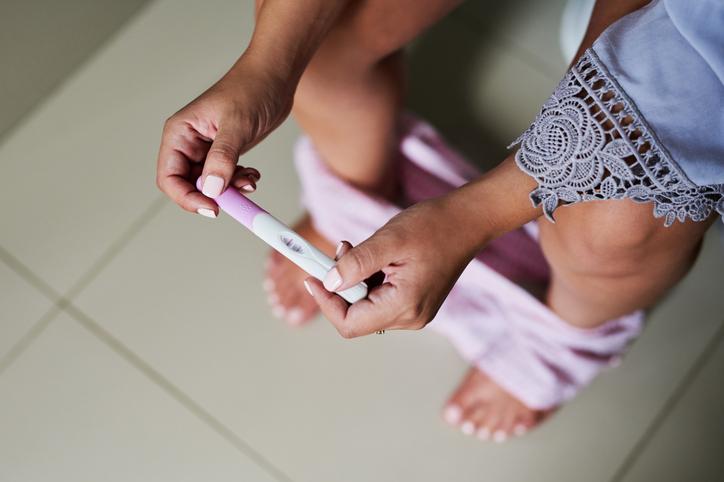
Pregnancy insomnia: how to get better sleep while pregnant
Peer reviewed by Dr Sarah Jarvis MBE, FRCGPLast updated by Emily Jane BashforthLast updated 8 Apr 2022
- DownloadDownload
- Share
Pregnancy can be a challenging time, especially if you are not getting enough rest. According to one study, 44% of pregnant people experienced insomnia during the first trimester. Fortunately, there are steps you can take to help alleviate pregnancy insomnia and make the experience as stress-free as possible.
In this article:
Continue reading below
Does pregnancy cause insomnia?
It isn't uncommon to have difficulty sleeping while pregnant. Pregnancy insomnia is more likely to occur in those who had sleeping problems before becoming pregnant. However, anyone can experience sleep disturbances.
Lesley Gilchrist is a registered midwife and co-founder of My Expert Midwife. She frequently hears stories about patients not being able to sleep.
She says there are many causes of pregnancy insomnia, and this can begin as early as the first trimester.
What causes insomnia during pregnancy?
Nausea
Nausea (feeling sick) and vomiting are among the most common causes of pregnancy insomnia and general sleep disturbance and tend to occur mostly during the first trimester, but can last throughout pregnancy. Although traditionally called 'morning sickness', pregnancy-related nausea and vomiting can occur at any time of day or night. To help combat this, it is recommended that you eat little and often throughout the day and avoid food a couple of hours before going to sleep.
Urinating more
From the first trimester, you may need to urinate frequently, which can disrupt your sleep and contribute to pregnancy insomnia. This is caused by your kidneys adjusting to hormonal changes in your body.
"Although this should settle down, the increase in the size of your uterus due to your baby growing will become a reason for frequent toilet visits later on in pregnancy, as your bladder will have less room to hold fluid," adds Gilchrist.
Aches and pains
Aches and pains are common side effects during most pregnancies, which can prevent you from getting a good night's sleep and so contribute to pregnancy insomnia.
Gilchrist explains that, as your bump grows, your posture can change, which uses different muscles and creates soreness and aching in different areas of your body. Hormonal changes (mainly an increase in progesterone), also loosen muscles and ligaments in preparation for giving birth.
Heartburn and reflux
Other conditions that can cause pregnancy insomnia include heartburn, indigestion, or acid reflux. Acid reflux affects between 30-80% of people while they're expecting.
This is largely caused by progesterone, as the sphincter which closes the stomach to the oesophagus can become lax, causing acid reflux.
Later in pregnancy, heartburn can become an issue as your growing baby puts pressure on your stomach and pushes digestive acids up your oesophagus.
Restless leg syndrome
Restless legs affect up to 25% of pregnant people, usually peaking during the third trimester. This creates an intense urge to move your legs, predominantly at night. Gilchrist says there isn't enough research to identify what causes this, but reducing caffeine intake and increasing physical activity are thought to relieve restless legs for some people.
Anxiety
Pregnancy can be a stressful time as you prepare for the arrival of your baby. If you are pregnant for the first time, it is likely you will have a lot of questions about labour and parenthood.
"Anxiety may make sleep more difficult during pregnancy. You may be more prone to developing mental health issues during pregnancy, especially if you have a history of mental illness or have had traumatic experiences with pregnancy in the past. Your midwife will be able to signpost you towards resources to help with this and some areas have specialist teams to help," says Gilchrist.
Snoring
A significant number of people start snoring for the first time, or develop sleep apnoea, while pregnant. It tends to start in the second trimester (around 16 weeks) as pregnancy hormones can cause nasal congestion, which can increase when you lie down and cause pregnancy insomnia. Gilchrist adds that weight gain in pregnancy can lead to snoring if you have extra tissue around your neck.
Vivid dreams
Vivid dreams and nightmares are common in pregnancy. One study found that women report having more frequent nightmares during pregnancy, many of which involve their baby or childbirth. These nightmares can be caused by a variety of factors, including stress, fears surrounding childbirth, and experiencing broken sleep.
Continue reading below
What can I do to help me sleep while pregnant?
Being unable to sleep during pregnancy can be frustrating, but there are ways to ease discomfort.
Establish a regular bedtime routine
While this sounds obvious, it can take great effort to achieve, especially while pregnant.
To do this, Gilchrist suggests setting time limits for getting into bed to wind down before sleeping. You should also:
Avoid TVs, phones or screens for a couple of hours before bed.
Take a relaxing bath with your favourite essential oils as part of your evening routine.
Use hypnobirthing tracks to relax your mind as well as help you to prepare for birth.
Ensure your bedroom is dark or that you have blinds with a blackout lining.
Adjust the temperature with either extra layers, opening windows or using a fan, to ensure you are neither too hot nor too cold.
Try gentle exercise
"Exercise can have positive effects on both your physical and mental health, so try to choose a type that is enjoyable and fits into your weekly routine as this will mean you are more likely to stick with it," adds Gilchrist.
Exercise can also help to relieve symptoms that may be keeping you awake, such as restless legs and cramps, with light activities, such as antenatal yoga or stretching, being best for this.
Low-impact exercises before bed can help you unwind at the end of the day while alleviating back pain and strengthening muscles. Avoid vigorous activity too close to bedtime.
Make small lifestyle changes
Making small alterations to your routine can have a big impact on pregnancy insomnia. For example, eating smaller meals throughout the day can help to prevent heartburn. Limiting your fluid intake right before bed can prevent the need to urinate during the night. You might also want to invest in a new pillow for added comfort.
What are the best sleeping positions for different stages in pregnancy?
Gilchrist says that, during early pregnancy, the best sleeping positions are whatever feels most comfortable. There is no specific position recommended for sleep until the third trimester (after 28 weeks).
Research has found that, after this point, sleeping on your back can increase the risk of stillbirth. It is said to increase the risk of stillbirth by 2.6 times. Therefore, in later pregnancy, it is safer to go to sleep on your side than sleep on your back.
"The reason for this is that, when you are lying on your back, your baby, which has now grown much bigger, can compress the blood vessels which supply your uterus, restricting the flow of blood and oxygen to the baby. The current advice is not to sleep on your back but on your side, preferably your left side, to prevent this," adds Gilchrist.
Most people will automatically find lying on their back uncomfortable by this stage in pregnancy, but if you do wake in the night on your back, don't panic, just move on to your side.
If you are worried that you regularly find yourself waking and lying on your back, try placing a pillow or two behind you to prevent this.
Gilchrist also recommends tying your hair in a bun, if it is long enough, to prevent you from lying on your back.
Patient picks for General pregnancy information

Pregnancy
Women denied abortion may experience long-term health problems
New research shows that women who are denied abortions are more likely to develop health conditions and report poor mental well-being.
by Milly Evans

Pregnancy
Early pregnancy signs and symptoms
Pregnancy tests are very sensitive so it is common to find out that you are pregnant before you develop any signs or symptoms of pregnancy. However, as your pregnancy continues you may experience these early symptoms and signs of pregnancy. For further advice about having a healthy pregnancy, see also the leaflet Planning to Become Pregnant, which includes information about prenatal vitamin recommendations.
by Dr Colin Tidy, MRCGP
Continue reading below
Can pregnancy sleeping pillows help?
Pregnancy pillows come in a range of shapes and sizes and they offer a range of benefits for anybody experiencing pregnancy insomnia, such as:
Enhanced blood circulation.
Alleviating aches and pains.
Allowing for longer sleeping hours.
They can make your nights more comfortable and can even be used after you have given birth, while breastfeeding, for example.
Finding support for pregnancy insomnia
Alongside making adjustments to your everyday routine, if your insomnia is persistent, you should speak to your GP or midwife. They can advise the best course of action or refer you to other services if necessary, such as talking therapies, which you can in fact refer yourself to via the NHS.
Additionally, antenatal groups are a good way to meet other expectant parents and remind yourself that you aren't alone in your struggles. Simply talking to someone who understands what you are going through can be hugely beneficial.
Are pregnancy sleeping pillows beneficial?
A maternity pillow is specially designed to support the changing contours and curves of your body during pregnancy. Many people find them helpful, particularly in the later stages of pregnancy.
Types of pregnancy pillows
There are a range of pregnancy pillows depending on how you prefer to sleep and what stage in pregnancy you are in.
U-shaped pregnancy pillow.
C-shaped pregnancy pillow.
A pregnancy wedge pillow.
Inflatable pregnancy pillow.
When it comes to using a pregnancy pillow, it is recommended that you place it under your right hip and buttock, tilting your body at a 45-degree angle to the left.
Benefits of pregnancy pillows
Alleviates aches and pains
Gilchrist explains that pregnancy pillows can offer support against aches and pains. This discomfort can be more likely as you gain weight during pregnancy, as the pressure and stress on your back, hips and legs increase.
“Pillows can support you lying on your side during later pregnancy and create more comfort if you have aches and pains, such as pelvic girdle pain,” explains Gilchrist.
Enhances blood circulation
A pregnancy pillow can make sleeping on your side more comfortable. This position can become increasingly uncomfortable as your bump grows. Sleeping on your side allows for better blood circulation. Sleeping on your left side is recommended over the right, as it makes your heart's job easier and prevents the baby's weight from applying pressure to the large vein (called the inferior vena cava) that carries blood back to your heart.
Increases sleeping hours
Pregnancy pillows can allow for a deeper, more relaxed sleep. This is key to improving your mental and emotional well-being while pregnant, as getting enough rest is key to keeping you safe and your baby healthy.
Pregnancy pillows can even be useful after your baby has been born if you’re conscious of spending money on something that you will only use for a few months. After delivery, a pregnancy pillow can help you put your baby in the right position for breastfeeding, for example.
Article history
The information on this page is peer reviewed by qualified clinicians.
8 Apr 2022 | Latest version
8 Apr 2022 | Originally published

Ask, share, connect.
Browse discussions, ask questions, and share experiences across hundreds of health topics.

Feeling unwell?
Assess your symptoms online for free